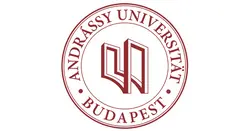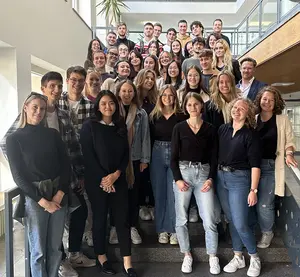M. Sc. in International Economics and Business
Andrássy University Budapest was founded in 2001 and is the only fully German-speaking university outside the German-speaking world. As a university accredited in Hungary with a European focus, it is supported by five partner countries: Germany, Bavaria, Baden-Württemberg, Austria and Hungary. It focuses on the future shape of Europe with an emphasis on the perspectives of Central and Eastern Europe and the Danube region. The university aims to train and promote European experts and to promote interdisciplinarity in teaching and research.
The double master's programme combines the strengths of two degree programmes and two universities that have been cooperating closely for many years. The study concept at both universities emphasises the development of an individual academic profile. Internationality with an explicit European focus as well as interdisciplinarity with a strong focus on behavioural economics are emphasised.
The M.Sc. International Economics and Business in Budapest is generally taught in German, while the M.Sc. European Economic Studies in Bamberg is taught in English.
Students starting the programme in Bamberg (Bamberg = home institution)
Application and admission
If you would like to begin your studies in Bamberg (home institution), admission is always possible in the winter semester. The application for double degree programmes is made as part of the application for the Master's degree programme in European Economic Studies and is integrated into the online application for the degree programme during the application phase. Unfortunately, we cannot accept applications from students who are already enrolled on the Master's programme. Further information about the online application procedure and the admission requirements can be found here:
>>>Application for a Master´s programme
Please note the shorter application deadlines for the double degree programmes: Applications for the winter semester 2024/25 will be possible from mid-May when the online portal for Master's applications opens. The application deadline ends on
24.06.2024
In addition to the regular application documents, you must submit the following:
- Letter of motivation in German
- Curriculum vitae
- Proof of language proficiency (B2 in English)
- Proof of language skills (B2 in German)
At the time of application, school or university certificates, for example, are also accepted in addition to the usual recognised language certificates. For registration at the partner university, which takes place in the first semester (usually at the end of November), an official and up-to-date language certificate must then be provided. The registration for the second year at the partner university as well as the examination for an Erasmus scholarship is organised by the International Office of the University of Bamberg during the first semester. The following language certificates are currently accepted by the International Office:
- TOEFL ibT with at least 80 points
- IELTS Academic with at least 6.5 points
- Cambridge First Certificate (FCE), level B2
- Cambridge Certificate in Advanced English (CAE), level C1
- Cambridge Certificate of Proficiency in English (CPE), level C2
- In addition, the free language test of the Bamberg Language Centre with a result of at least B2 is accepted.
The requirements for admission to the Master's degree programme in European Economic Studies can be found in the study and examination regulations.
>>>Study and examination regulations
>>>Further information on the degree programme admission
Admission to a double degree programme at the University of Bamberg is usually only provisional until admission is granted by the partner university. Admission can only be granted during the first year in Bamberg, as it is dependent on other criteria (study progress, language tests, etc.).
If you receive a letter of admission for one of the Master's degree programmes, but no place on a double degree programme, your admission to the regular Master's degree programme remains valid. You will then still have the opportunity to apply for a regular study abroad programme. After selection by the home university and receipt of the letter of admission from the partner university, students are admitted to the double degree programme. Admission by the partner university is usually a formality and does not require a separate selection procedure. Applications for the double degree programme that are sent directly to a partner university will not be accepted.
In principle, the double degree programme can be started at both universities. Information on applying to Andrássy can be found here:
Students starting the programme in Budapest (Andrássy = home institution)
Admission to the second year of study
If you started your studies at Andrássy University (as your home university) and come to Bamberg for your second year of study, you will have to go through a simplified admission process. This begins with you being nominated by your home university. You will then receive all the information you need from the International Office (IO) of the University of Bamberg to prepare for your academic year in Bamberg (halls of residence, introductory and language courses, etc.). Further information on these topics can also be found on the homepage of the IO:
>>>Preparing your stay in Bamberg
Unlike regular exchange students, double degree students are regularly enrolled in Bamberg. You must submit an application via the online application procedure of the Registrar's Office. You will receive an email with all important information and deadlines after your nomination. Please wait until you are contacted by the SoWi double degree coordinator. You will then find the online application here:
There will also be an introductory event for double degrees at the SoWi at the beginning of the semester where you will have the opportunity to get to know other students who are also studying for a double degree. You will also receive a personal invitation by email.
Study programme
The degree programme comprises 4 semesters. Students spend the first two semesters at their home university and the last two semesters at the host university. During their stay at the host university, students remain enrolled at their home university. The coursework completed as part of the double degree programme is recognised as equivalent by both universities. The following tables provide information on the allocation of credits for the degree in Bamberg:
Module overview
| Starting in Bamberg | Starting in Budapest | |||
|---|---|---|---|---|
| Modul group | 1. year in Bamberg | 2. year in Budapest | 1. year in Budapest | 2. year in Bamberg |
| MAEES1 Core Curriculum: Economic Theory and Methods | 24 | 24 | ||
| MAEES2 Foreign Business Language | 12 | 12 | ||
| MAEES Specialisation | 24 | 36 | 24 | 36 |
| MAEES12 Master Thesis | 24 | 24 | ||
| Total ECTS | 120 | 120 | ||
The programme details essentially depend on whether the programme is started in Bamberg or Budapest. The following overview is intended as a planning and orientation guide, while the individual course contents result from the individual recognition agreements that the students make with the coordinators of both universities and which are based on the respective valid versions of the study and examination regulations of the degree programmes. The current study programme in Bamberg is determined by the current version of the module handbook.
>>>Current study programme in Bamberg (Module handbook M. Sc. EES)
First year Bamberg | Second year Budapest | |
|---|---|---|
| MAEES1 Core Curriculum: Economic Theory and Methods | ||
| MAEES1.1: Advanced Microeconomics | 6 | |
| MAEES1.2: Advanced Macroeconomics | 6 | |
| Mathe-M-01: Advanced Mathematical Methods | 6 | |
| One of the following courses | ||
| SuStat-014-M: Advanced Econometrics | 6 | |
| SuStat-013-M: Introduction to Econometrics | 6 | |
| 24 | ||
| MAEES2 Foreign Languages | ||
| They can choose one of the Foreign Business Languages currently offered in master EES. | 12 | |
| 12 | ||
| MAEES Specialisation | ||
| Four modules from the module groups MAEES3-10 amounting to 24 ECTS (according to the current Master EES module handbook) | 4x6=24 | |
| 1st Semester Budapest | ||
| Compulsory electives from modules 1-3 and 5 | 27 | |
| 2nd Semester Budapest | ||
| Compulsory electives from modules 1-3 and 5 | 9 | |
| 60 | ||
| MAEES12 Thesis | ||
Vorbereitende Kurse zur Masterarbeit: - Current Topics in Economics and Business Administration - Empirische Wirtschaftsforschung 2 |
3 6 | |
| Masterarbeit | 15 | |
| 24 | ||
| First year Budapest | Second year Bamberg | |
|---|---|---|
| MAEES1 Core Curriculum: Economic Theory and Methods | ||
| Internationale Arbeitsteilung und Globalisierung | 6 | |
| Managerial Economics | 3 | |
| Spieltheorie und strategisches Verhalten | 3 | |
| Empirische Wirtschaftsforschung 1 | 6 | |
| Empirische Wirtschaftsforschung 3 | 6 | |
| 24 | ||
| MAEES2 Foreign Business Language | ||
| Business English 1 | 3 | |
| Business English 2 | 3 | |
| Das politische System der EU | 3 | |
| Mitteleuropa und der Donauraum als historische Region | 3 | |
| 12 | ||
| MAEES Spezialisierung | ||
| Compulsory electives from modules 1-3 and 5 | 24 | |
| six modules from the module groups MAEES3-10 amounting to 36 ECTS (according to the current Master EES module handbook) | 6x6=36 | |
| 60 | ||
| MAEES12 Master Thesis | ||
| Master Thesis | 24 | |
| 24 | ||
Assignment of equivalent modules
When planning your degree programme, you should also bear in mind that equivalent modules can only be taken once. For these modules, students must decide whether they want to take the module in Bamberg or in Budapest. Taking a module at one university excludes the equivalent module for study at the other university. The following table shows which modules are equivalent.
| Bamberg | Budapest |
|---|---|
| MAEES1.1 Advanced Macroeconomics | WIWI0278 Internationale Arbeitsteilung und Globalisierung |
| MAEES1.2 Advanced Microeconomics | WIWI034 Managherial Economics |
| WIWI029 Spieltheorie und strategisches Verhalten | |
| Mathe-M-01 Advanced Mathematical Methods | WIWI096 Empirische Wirtschaftsforschung 3 |
| SuStat-013-M Introduction to Econometrics | WIWI030/020 Empirische Wirtschaftsforschung 1 |
| SuStat-014-M Advanced Econometrics | |
| MAESS2 Foreign Business Language 3 (oder 1) | POWI004 Das politische System der EU |
| MML042 Business English 1 | |
| MAEES2 Foreign Business Language 4 (oder 2) | MESKD010 Mitteleuropa und der Donauraum als historische Region |
| MML043 Business English 2 | |
| MAEES12 Master Thesis | WIWI200 Masterarbeit |
| WIWI095 Empirische Wirtschaftsforschung 2 | |
| WIWI089 Current Topics in Economics and Business Administration |





